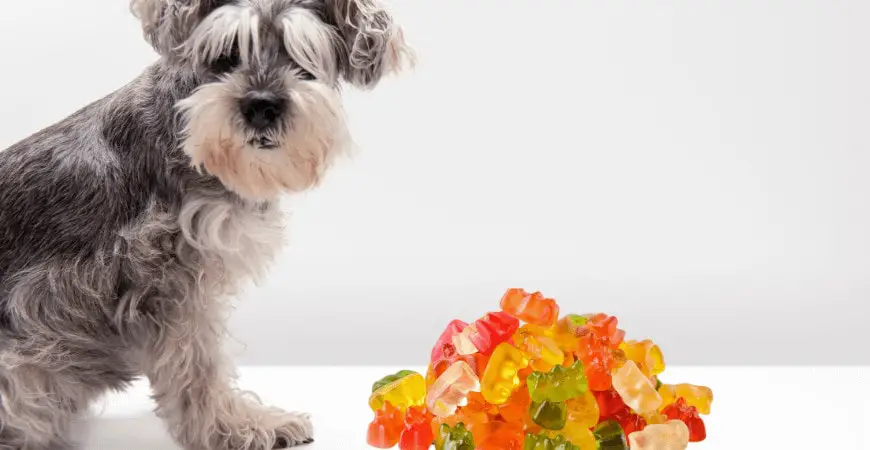
Sure, dogs can eat gummy bears, but whether or not they should eat them is the real question. Even if these cute, gelatinous snacks don’t contain a harmful artificial sweetener called xylitol, they can still cause stomach upset, obesity, tooth decay and diabetes.
Ingestion of inappropriate foods and items by dogs is a common occurrence in veterinary medicine. As a Veterinary Technician since 2011, I’ve seen my fair share of dogs eating things they shouldn’t; gummy bears included.
These tasty human treats are not meant to be given to dogs, but if your pooch has accidentally ingested some or even if you’re just curious, then keep reading to learn more about gummy bears and dogs.
Are Gummy Bears Safe For Dogs?
Gummy bears that are made for human consumption are not safe for dogs to eat. The reason is because these chewy rainbow colored snacks are often made from harmful ingredients such as xylitol.
Even if the gummies don’t contain the dangerous ingredient, xylitol, they do still include real sugar, citric acid and gelatin which can cause unnecessary weight gain and elevated blood sugar levels. Therefore, gummy bears should not be fed to dogs.
When a dog eats candy, gummy bears or chewing gum with xylitol in it they are in danger. Xylitol is quickly absorbed into the bloodstream where it then tells the pancreas to produce more insulin which causes low blood sugar (hypoglycemia). If left untreated, xylitol ingestion can cause death or liver failure.
Are Gummy Bears Bad For My Dog?
Whether gummy bears are bad for your dog depends on what ingredients are in them. There are three types of gummy snacks and candies that are found in households: the regular gummy bears, sugar-free gummy bears and THC edible gummies. All three have different effects on your dog’s body.
Traditional gummy bears or “regular” gummies will contain loads of sugar that are likely to upset your dog’s stomach, cause cavities, weight gain, pancreatitis or even cause a gastrointestinal obstruction.
The sugar-free gummy bears contain xylitol (also known as a sugar alcohol), which is toxic to dogs and can cause death if left untreated. When xylitol enters the bloodstream, it causes the pancreas to secrete more insulin than necessary, which results in low blood sugar. This harmful substance is also responsible for acute liver failure in dogs.
Finally, the THC gummy bears. These snacks are “edibles” meaning they contain cannabinoids, the THC substance (or CBD) derived from the marijuana plant. THC is the toxic and harmful ingredient that can cause incoordination (drunken walk), slow heart rate and lethargy. It’ll be a double whammy of bad news if the gummies also include xylitol instead of sugar.
If your dog accidentally ingests a THC gummy, then call your veterinarian right away. It is also important to be honest with your vet as they are more worried about helping your pet than reporting you to the police.
*CBD supplements can be found specifically formulated for dogs. If you are interested in trying one of these supplements, please talk with your veterinarian prior to giving them to your pup.
Ingredients In Gummy Bears That Will Affect A Dog’s Health
I know that we’ve touched on these subjects already, but let’s take a deeper dive into the harmful ingredients for dogs that can be found in gummy bears.
Sugar
We all love sugar, including our dogs. It’s tasty and sweet and our pup’s just can’t resist! Unfortunately for our favorite companions, sugar is really not good for them. When a dog ingests too much sugar on a regular basis, they can develop a few issues:
– Digestive issues: Common digestive problems that come from your dog eating too many sugary gummy bears are vomiting and diarrhea and in worse cases, pancreatitis.
– Tooth decay: Tooth decay is a big problem with dogs that have a diet that includes sugars, resulting in rotten teeth, pain and cavities.
– Obesity and diabetes: Dogs don’t need to eat sugar to survive because they instead ingest carbs which break down into the sugars they need for energy. Feeding sugars will result in obesity and diabetes in the future.
So, while something sweet is certainly a treat for your canine companion, you are not providing your dog with any nutritional value and are potentially causing more harm than good.
Xylitol
Xylitol is an artificial sweetener that is present in many chewing gums, gummy bears and candies. It causes the pancreas to secrete more insulin than necessary, resulting in hypoglycemia, acute liver failure and death in dogs.
How Much Xylitol Is Toxic To Dogs
Only 50 milligrams of xylitol per pound of body weight is necessary to cause an adverse reaction in dogs. The average gummy bear includes over 1 gram of xylitol.
Symptoms And Signs Of Xylitol Toxicity In Dogs
If you are worried or know that your dog has ingested xylitol, don’t hesitate to reach out to your vet right away. The faster that you address the problem, the more likely they will recover without much issue.
Signs and symptoms of xylitol toxicity are:
– Vomiting
– Weakness
– Difficulty walking (drunken walk)
– Lethargy/depression
– Seizures
– Tremors
– Coma
– Death
The Effects Of Xylitol
Xylitol causes a drop in blood sugar, resulting in hypoglycemia, which will lead to weakness, lethargy, uncoordinated gait, seizures and potentially death. Another common side effect of xylitol toxicity is liver damage (or worst case, failure).
Gelatin
Gelatin is what gives gummy bears their chewy texture. While gelatin by itself isn’t necessarily bad for dogs, when it is combined with sugar, artificial flavors and food coloring then it’s something that needs to be avoided.
Citric Acid
Citric acid is an ingredient in gummy bears and many other candies as it is used to bring out the sweet and sour flavor while also acting as a preservative to give them a longer shelf-life. Citric acid in small quantities can be fine but when dogs ingest a large amount it can depress their central nervous system.
Thankfully, most dogs don’t enjoy the flavor of foods that include citric acid.
Artificial Flavors
Many people are aware of the issues that artificial flavors and colors can have on children and they have a similar effect on dogs.
Artificial flavors are what give the gummy bears their yummy taste and they can be dangerous because the companies often do not list where the artificial flavor comes from. Sometimes these man-made flavor substitutes include the harmful ingredient, xylitol.
Not only are artificial flavors potentially dangerous but the artificial colors can also cause problems in dogs.
Yellow 5 and Red 40
The common artificial colors, yellow 5 and red 40 are known for their attributions towards tumor development, allergies and hyperactive behaviors.
Blue 1
This dye is derived from coal tar. Found to potentially cause brain tumors in lab mice.
No matter the testing and potential risks with these artificial colors and flavors, the FDA has deemed them all safe to include in pet foods, gummy bears and other food items.
What Should I Do If My Dog Eats Gummy Bears?
Oh no! Your dog has eaten some gummy bears, so what should you do next? Well, depending on the ingredients, the size of your dog and the quantity ingested, you may have to think fast and act quickly to get them to the veterinarian.
Step #1: Check Your Dog For Signs And Symptoms
At this time, you should look over and examine your dog closely. You are checking for signs and symptoms such as pacing, discomfort and distress. More severe symptoms may include seizures or collapse.
If you don’t currently see any signs of xylitol toxicity but know that it was an ingredient in the gummy bears they ingested, contact your veterinarian right away.
Step #2: Get Rid Of The Gummies!
Clearing the area of the harmful food item, in this case, gummy bears and their packaging, should be one of the first things you do. This is to ensure that other pets (or even the same dog) doesn’t make the same mistake.
Step #3: Do Some Detective Work
Trying to figure out how many gummy bears your dog has eaten, the brand and the main ingredients can be tricky sometimes, especially if your dog ate the wrapping. However, it is crucial to know this as it can define what steps of treatment you and your veterinarian will need to take.
Step #4: CALL YOUR VET!
Don’t hesitate to reach out to your vet in the event of your dog ingesting gummy bears. Give them as much information as possible, such as your dog’s age, breed, weight, what they ate and any signs and symptoms you are seeing.
You can always bring the packaging in with you to the veterinarian if you are not sure what to look for.
*Xylitol is sometimes labeled as E967 or INS 967 on packages.
Monitoring Your Dog
If your veterinarian has deemed your dog is ok to stay home, monitoring your pet for the next 24 hours will be extremely important. Keep an eye out for any gastrointestinal upset like vomiting or diarrhea and call your veterinarian right away if any adverse signs are noted.
What Not To Do: Should I Make My Dog Vomit?
If only a few gummy bears were ingested very recently, your vet may recommend having your dog throw up. However, this should not be attempted without the guidance and supervision of your vet.
If your dog is hypoglycemic, having them vomit could make their issue even worse. If they are somewhat sedated from the effects of a THC gummy, then they could potentially choke or aspirate on their vomit. This is why it is so important to have a veterinary professional perform this task.
Different Types Of Gummy Candies And Dogs
Can Dogs Eat Sour Gummy Bears?
As long as there is no xylitol present, they are not directly at risk of severe issues. However the citric acid, sugar as well as artificial flavors and colors. All of these ingredients can cause stomach upset, weight gain and diabetes in dogs.
Can Dogs Eat Gummy Bears Without Xylitol?
Regular gummy bears, or gummy bears that are free of xylitol, may not necessarily be life-threatening but they still contain excessive amounts of sugars and fats, which can cause issues with weight gain, diabetes, gastrointestinal upset and pancreatitis.
Can Dogs Eat Sugar-Free Gummy Bears?
No, dogs cannot eat sugar-free gummy bears because they contain an artificial sweetener called xylitol, which can be life-threatening if ingested in certain quantities. Xylitol is not only found in gummy candies but is also a common ingredient in chewing gum, mints, toothpaste and mouthwash.
Can Dogs Eat Healthy Gummies Or Vitamin Gummies?
No, not only are these gummies formulated specifically for humans, but most of these healthy or vitamin gummies also include xylitol. This ingredient is highly toxic to dogs and must be avoided at all costs.
A common gummy vitamin that people ask about giving to their dog is a fish oil gummy supplement. These include gelatin and are very high in sugar content, potentially leading to stomach upset and pain, weight gain and diabetes.
Can Dogs Eat Albanese Gummies?
Thankfully, Albanese gummies do not include xylitol but they do have maltitol sugar (another sugar alcohol). This ingredient is not toxic but it is not recommended that it is given to dogs. These gummy bears can cause stomach upset and obesity.
Can Dogs Eat Haribo Gummy Bears?
Haribo gummy bears thankfully do not include xylitol, but they are rich in sugars and fats. Maltitol sugar and artificial colors are present in these gummy bears as well as some lactose and wheat which can cause issues in dogs with a lactose intolerance.
Can Dogs Eat Black Forest Gummy Bears?
While Black Forest gummy bears don’t have xylitol, they do include a lot of sugar, fats, citric acid and artificial colors. These ingredients aren’t life-threatening but they can lead to tooth decay, obesity and diabetes in dogs.
Can Dogs Eat Gummy Lifesavers?
Much like the ones before it, these gummies don’t include xylitol but they are rich in high concentrations of sugars, which will lead to tooth decay, obesity, gastrointestinal upset and diabetes in dogs.
Can Dogs Eat CBD, Hemp Or THC Gummies?
All of these gummies include an excessive amount of sugars that dogs simply don’t need. On top of that, they also include ingredients such as CBD, hemp or THC, and all of these can be a problem.
CBD gummies can be problematic because of the sugar as well as the CBD. There is minimal data to back up the effectiveness and safety of these products in dogs. However, there are several formulations that can be found online that are supposedly specifically for dogs. (these are not FDA approved)
With hemp gummies, the sugar is the problem, not the hemp.
THC is not safe to give to dogs and can cause symptoms such as central nervous system depression and even unconsciousness if they ate too many.
Can Dogs Eat Gummy Candies And Snacks?
NO, dog’s cannot have these foods as they are full of unnecessary and harmful sugars that can lead to digestive issues, weight gain and diabetes. Always avoid giving your dog any human foods that are full of sugars.
Can Dogs Have Peach Gummy Rings?
Nope, these super sweet gummies should also be avoided. Just like all these others, these peach flavored candies don’t even contain real peach flavoring. That’s right, they are just full of sugar and artificial flavors!
Can Dogs Eat Any Gummy Worms?
The story is the same for gummy worms and gummy bears. They are just in a different shape! Gummy worms can also include xylitol or too much sugar and citric acid to be safe for our dogs to eat.
Whether the gummy worms are sour, regular or Trolli brand, they should be avoided.
Can Dogs Eat Gummy Fruit Snacks?
These tasty and popular gummies for kids have less artificial colors and preservatives but they are still full of sugar from fruit juice. While these fruit juices may be a little healthier than just straight sugar, they can still cause gastrointestinal upset, weight gain and diabetes in dogs.
Can Dogs Die From Eating Gummy Bears?
Yes, if the gummy bears include the artificial sweetener ingredient xylitol, then they are at risk of death. Xylitol works by entering the bloodstream, telling the pancreas to secrete more insulin than necessary which will lead to a drop in blood sugar.
Immediate veterinary care is highly recommended as they can show symptoms of xylitol toxicity in less than 10 minutes. Hypoglycemia caused by this ingredient can lead to liver failure and death.
Are Gummy Bears Good Or Ok For Dogs?
No, gummy bears are not good or ok for dogs. There is no nutritional benefit to your dog eating gummy bears. They can lead to death if the gummy bears include the artificial sweetener, xylitol. Even if xylitol is not present, gummy bears are still full of unnecessary sugars, fats, carbs and citric acids which can lead to health problems like obesity, gastrointestinal upset, diabetes and heart issues.
Can A Dog Eat A Small Amount Of Gummy Bears?
If a large dog (70 lbs or more) were to eat one or even 3 gummy bears (that did NOT include xylitol), they would probably be fine. They may still experience some temporary tummy upset and your vet will still recommend that you monitor them closely.
A little dog is likely to experience more issues with gastrointestinal upset over eating the same amount of gummy bears as a large dog.
Can Puppies Eat Gummy Bears?
No, puppies should stay away from gummy bears, just like adults. As a matter of fact, young dogs are more susceptible to becoming hypoglycemic, putting them at even higher risk of fatality if they were to ingest sugar-free gummy bears.
Recipe For Dog-Friendly Gummy Bears
If you’re really wanting to share some fun, gummy snacks with your dog but want to do it safely, just give these dog-friendly gummy recipes a try!
Super Easy Homemade Broth Gummies For Dogs
– Unflavored Knox Gelatin
– Chicken broth
– Silicone mold or tray
– Olive oil spray
- Gently spray or mist the mold or tray with olive oil.
- Use 2 packets of gelatin (2 tablespoons) and add to a ¼ cup of cold chicken broth. Let your gelatin “bloom” for about a minute before adding the rest of the broth.
- Heat up ½ cup of broth to a boil and add it to the gelatin/broth mixture. Pour the liquid into your mold or tray and allow it to refrigerate for 4-5 hours.
This recipe is a great base for any kind of doggie gummies you would like to make. You can spice up your formula by changing your chicken broth to beef broth or use an organic juice (like pear). You can pulverize dog-healthy fruits or vegetables to sprinkle on top of the gummies before refrigerating them. Don’t hesitate to get creative, just make sure your ingredients are safe!
Conclusion: Can Dogs Eat Gummy Bears?
If a gummy bear does not include the harmful artificial sweetener, xylitol, then a dog can eat a few gummy bears without the risk of death. However, it’s just best to avoid letting your dog eat them. Even if they are free of xylitol, gummy bears are full of empty calories and serve no nutritional benefit.
Avoid giving your dog any kind of gummy bear, gummy worm or gummy snack in general as these tasty treats are chock full of sugars, carbs, citric acid and gelatin that can cause obesity, diabetes, tooth decay and if xylitol is present; death.
If you are wanting to supply your dog with a tasty, gummy snack, look into creating your own fun recipes at home!



















